Professional Development Planning and Ethics: A Competency Report
VerifiedAdded on 2020/04/15
|13
|3071
|89
Report
AI Summary
This report delves into the realm of professional development, focusing on the significance of socio-cultural competencies in fostering career advancement. The author, a middle-level manager in the banking and finance industry, provides a self-introduction and highlights the importance of skills like leadership, commitment, attitude, and self-direction. The report categorizes socio-cultural competencies into social skills, social perception, and leadership skills, emphasizing their relevance in today's competitive job market. It further explores how these competencies contribute to career growth, drawing examples from the author's own experiences and comparing them with those of successful accountants and nurses. The report concludes by summarizing expected outcomes and improvements, underscoring the need for these competencies to succeed in the evolving global workplace.
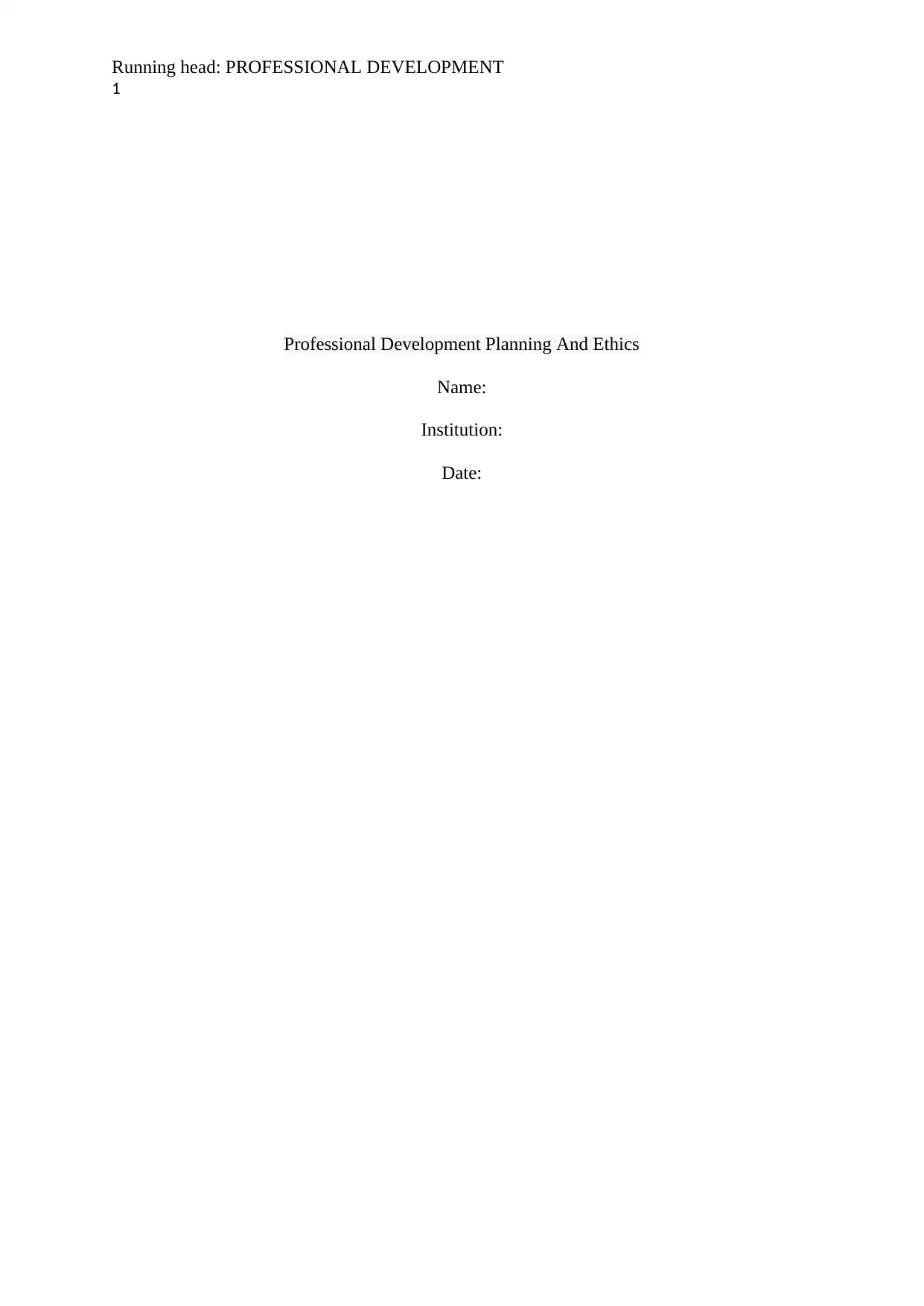
Running head: PROFESSIONAL DEVELOPMENT
1
Professional Development Planning And Ethics
Name:
Institution:
Date:
1
Professional Development Planning And Ethics
Name:
Institution:
Date:
Paraphrase This Document
Need a fresh take? Get an instant paraphrase of this document with our AI Paraphraser
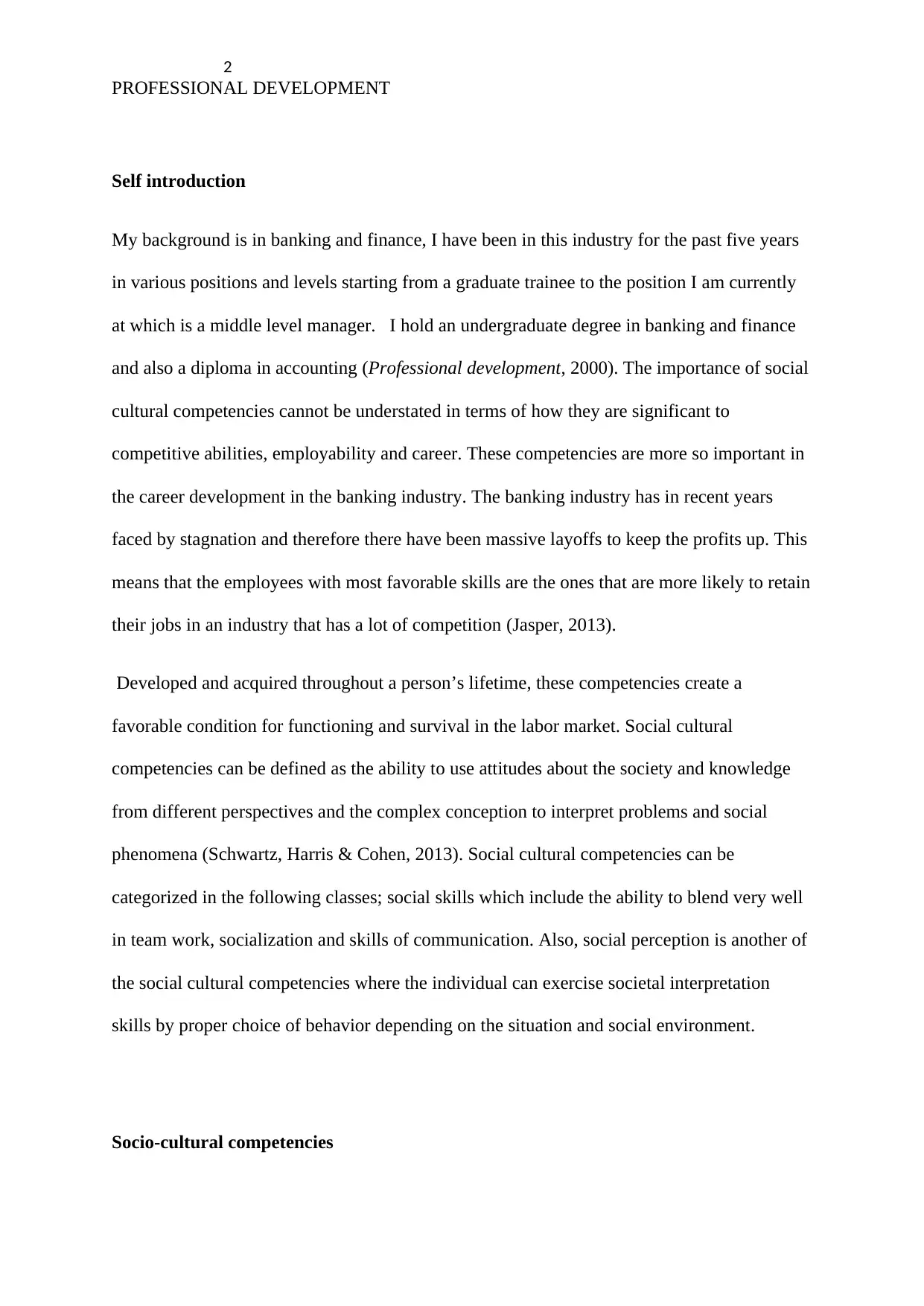
2
PROFESSIONAL DEVELOPMENT
Self introduction
My background is in banking and finance, I have been in this industry for the past five years
in various positions and levels starting from a graduate trainee to the position I am currently
at which is a middle level manager. I hold an undergraduate degree in banking and finance
and also a diploma in accounting (Professional development, 2000). The importance of social
cultural competencies cannot be understated in terms of how they are significant to
competitive abilities, employability and career. These competencies are more so important in
the career development in the banking industry. The banking industry has in recent years
faced by stagnation and therefore there have been massive layoffs to keep the profits up. This
means that the employees with most favorable skills are the ones that are more likely to retain
their jobs in an industry that has a lot of competition (Jasper, 2013).
Developed and acquired throughout a person’s lifetime, these competencies create a
favorable condition for functioning and survival in the labor market. Social cultural
competencies can be defined as the ability to use attitudes about the society and knowledge
from different perspectives and the complex conception to interpret problems and social
phenomena (Schwartz, Harris & Cohen, 2013). Social cultural competencies can be
categorized in the following classes; social skills which include the ability to blend very well
in team work, socialization and skills of communication. Also, social perception is another of
the social cultural competencies where the individual can exercise societal interpretation
skills by proper choice of behavior depending on the situation and social environment.
Socio-cultural competencies
PROFESSIONAL DEVELOPMENT
Self introduction
My background is in banking and finance, I have been in this industry for the past five years
in various positions and levels starting from a graduate trainee to the position I am currently
at which is a middle level manager. I hold an undergraduate degree in banking and finance
and also a diploma in accounting (Professional development, 2000). The importance of social
cultural competencies cannot be understated in terms of how they are significant to
competitive abilities, employability and career. These competencies are more so important in
the career development in the banking industry. The banking industry has in recent years
faced by stagnation and therefore there have been massive layoffs to keep the profits up. This
means that the employees with most favorable skills are the ones that are more likely to retain
their jobs in an industry that has a lot of competition (Jasper, 2013).
Developed and acquired throughout a person’s lifetime, these competencies create a
favorable condition for functioning and survival in the labor market. Social cultural
competencies can be defined as the ability to use attitudes about the society and knowledge
from different perspectives and the complex conception to interpret problems and social
phenomena (Schwartz, Harris & Cohen, 2013). Social cultural competencies can be
categorized in the following classes; social skills which include the ability to blend very well
in team work, socialization and skills of communication. Also, social perception is another of
the social cultural competencies where the individual can exercise societal interpretation
skills by proper choice of behavior depending on the situation and social environment.
Socio-cultural competencies
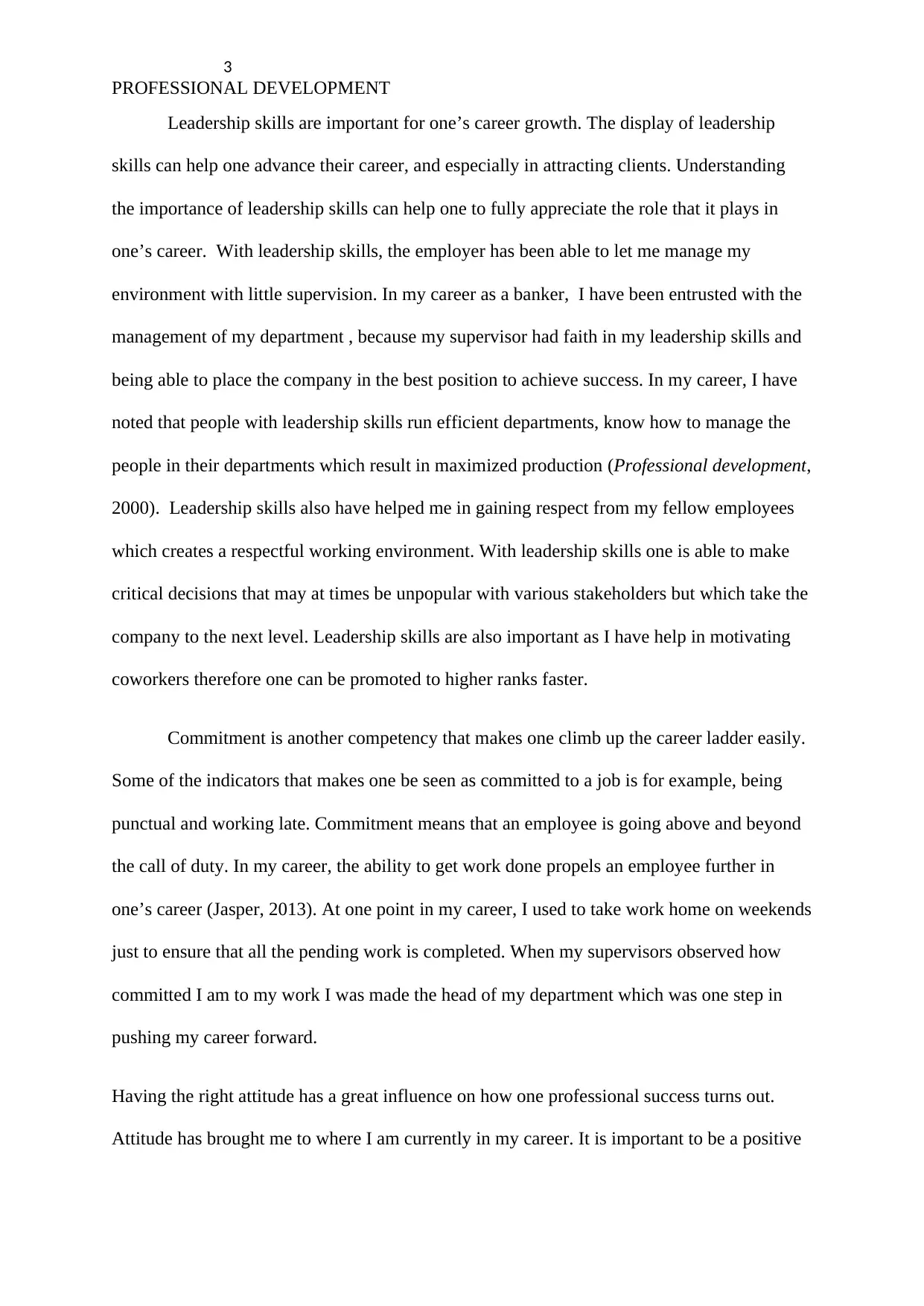
3
PROFESSIONAL DEVELOPMENT
Leadership skills are important for one’s career growth. The display of leadership
skills can help one advance their career, and especially in attracting clients. Understanding
the importance of leadership skills can help one to fully appreciate the role that it plays in
one’s career. With leadership skills, the employer has been able to let me manage my
environment with little supervision. In my career as a banker, I have been entrusted with the
management of my department , because my supervisor had faith in my leadership skills and
being able to place the company in the best position to achieve success. In my career, I have
noted that people with leadership skills run efficient departments, know how to manage the
people in their departments which result in maximized production (Professional development,
2000). Leadership skills also have helped me in gaining respect from my fellow employees
which creates a respectful working environment. With leadership skills one is able to make
critical decisions that may at times be unpopular with various stakeholders but which take the
company to the next level. Leadership skills are also important as I have help in motivating
coworkers therefore one can be promoted to higher ranks faster.
Commitment is another competency that makes one climb up the career ladder easily.
Some of the indicators that makes one be seen as committed to a job is for example, being
punctual and working late. Commitment means that an employee is going above and beyond
the call of duty. In my career, the ability to get work done propels an employee further in
one’s career (Jasper, 2013). At one point in my career, I used to take work home on weekends
just to ensure that all the pending work is completed. When my supervisors observed how
committed I am to my work I was made the head of my department which was one step in
pushing my career forward.
Having the right attitude has a great influence on how one professional success turns out.
Attitude has brought me to where I am currently in my career. It is important to be a positive
PROFESSIONAL DEVELOPMENT
Leadership skills are important for one’s career growth. The display of leadership
skills can help one advance their career, and especially in attracting clients. Understanding
the importance of leadership skills can help one to fully appreciate the role that it plays in
one’s career. With leadership skills, the employer has been able to let me manage my
environment with little supervision. In my career as a banker, I have been entrusted with the
management of my department , because my supervisor had faith in my leadership skills and
being able to place the company in the best position to achieve success. In my career, I have
noted that people with leadership skills run efficient departments, know how to manage the
people in their departments which result in maximized production (Professional development,
2000). Leadership skills also have helped me in gaining respect from my fellow employees
which creates a respectful working environment. With leadership skills one is able to make
critical decisions that may at times be unpopular with various stakeholders but which take the
company to the next level. Leadership skills are also important as I have help in motivating
coworkers therefore one can be promoted to higher ranks faster.
Commitment is another competency that makes one climb up the career ladder easily.
Some of the indicators that makes one be seen as committed to a job is for example, being
punctual and working late. Commitment means that an employee is going above and beyond
the call of duty. In my career, the ability to get work done propels an employee further in
one’s career (Jasper, 2013). At one point in my career, I used to take work home on weekends
just to ensure that all the pending work is completed. When my supervisors observed how
committed I am to my work I was made the head of my department which was one step in
pushing my career forward.
Having the right attitude has a great influence on how one professional success turns out.
Attitude has brought me to where I am currently in my career. It is important to be a positive
⊘ This is a preview!⊘
Do you want full access?
Subscribe today to unlock all pages.

Trusted by 1+ million students worldwide
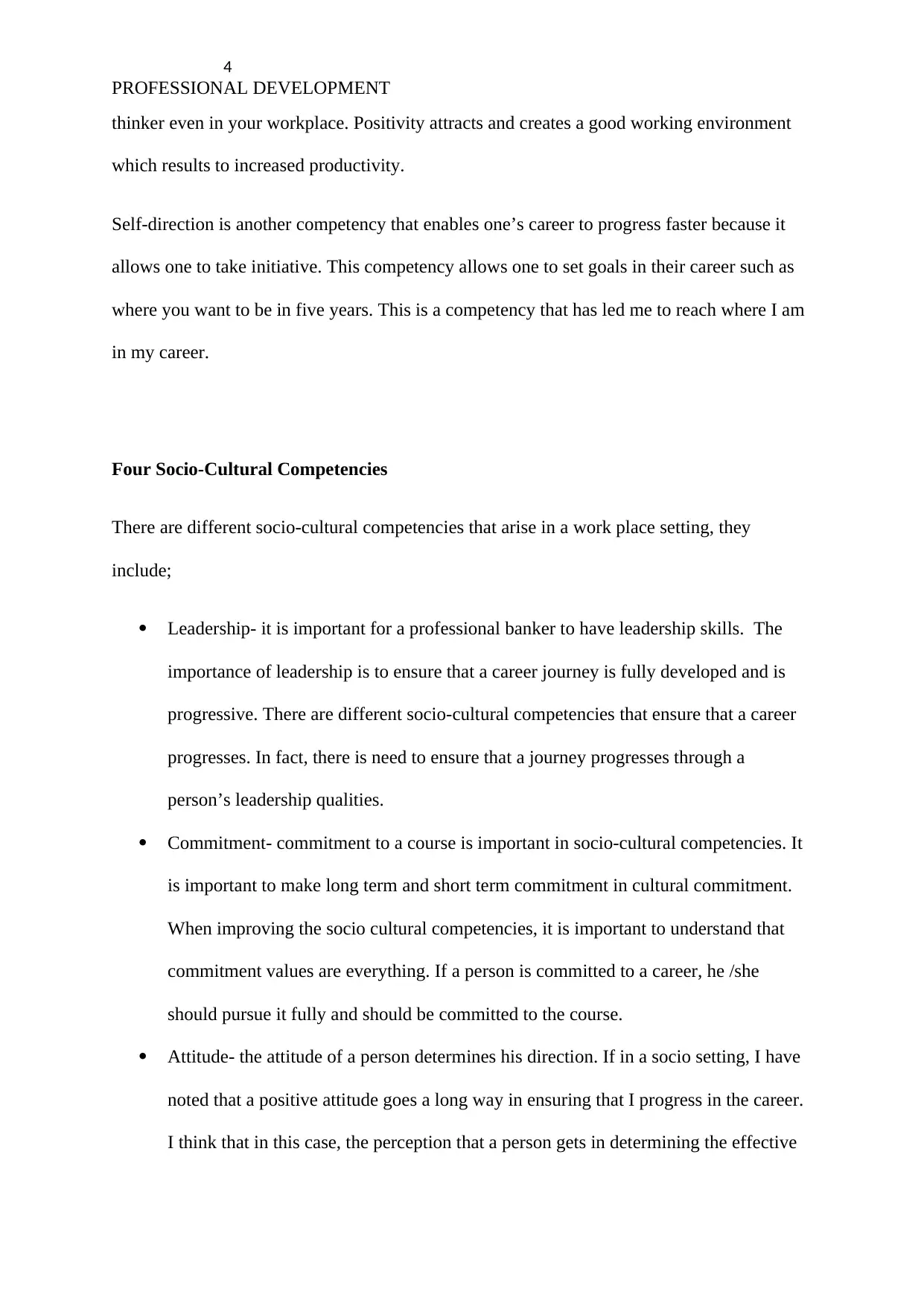
4
PROFESSIONAL DEVELOPMENT
thinker even in your workplace. Positivity attracts and creates a good working environment
which results to increased productivity.
Self-direction is another competency that enables one’s career to progress faster because it
allows one to take initiative. This competency allows one to set goals in their career such as
where you want to be in five years. This is a competency that has led me to reach where I am
in my career.
Four Socio-Cultural Competencies
There are different socio-cultural competencies that arise in a work place setting, they
include;
Leadership- it is important for a professional banker to have leadership skills. The
importance of leadership is to ensure that a career journey is fully developed and is
progressive. There are different socio-cultural competencies that ensure that a career
progresses. In fact, there is need to ensure that a journey progresses through a
person’s leadership qualities.
Commitment- commitment to a course is important in socio-cultural competencies. It
is important to make long term and short term commitment in cultural commitment.
When improving the socio cultural competencies, it is important to understand that
commitment values are everything. If a person is committed to a career, he /she
should pursue it fully and should be committed to the course.
Attitude- the attitude of a person determines his direction. If in a socio setting, I have
noted that a positive attitude goes a long way in ensuring that I progress in the career.
I think that in this case, the perception that a person gets in determining the effective
PROFESSIONAL DEVELOPMENT
thinker even in your workplace. Positivity attracts and creates a good working environment
which results to increased productivity.
Self-direction is another competency that enables one’s career to progress faster because it
allows one to take initiative. This competency allows one to set goals in their career such as
where you want to be in five years. This is a competency that has led me to reach where I am
in my career.
Four Socio-Cultural Competencies
There are different socio-cultural competencies that arise in a work place setting, they
include;
Leadership- it is important for a professional banker to have leadership skills. The
importance of leadership is to ensure that a career journey is fully developed and is
progressive. There are different socio-cultural competencies that ensure that a career
progresses. In fact, there is need to ensure that a journey progresses through a
person’s leadership qualities.
Commitment- commitment to a course is important in socio-cultural competencies. It
is important to make long term and short term commitment in cultural commitment.
When improving the socio cultural competencies, it is important to understand that
commitment values are everything. If a person is committed to a career, he /she
should pursue it fully and should be committed to the course.
Attitude- the attitude of a person determines his direction. If in a socio setting, I have
noted that a positive attitude goes a long way in ensuring that I progress in the career.
I think that in this case, the perception that a person gets in determining the effective
Paraphrase This Document
Need a fresh take? Get an instant paraphrase of this document with our AI Paraphraser
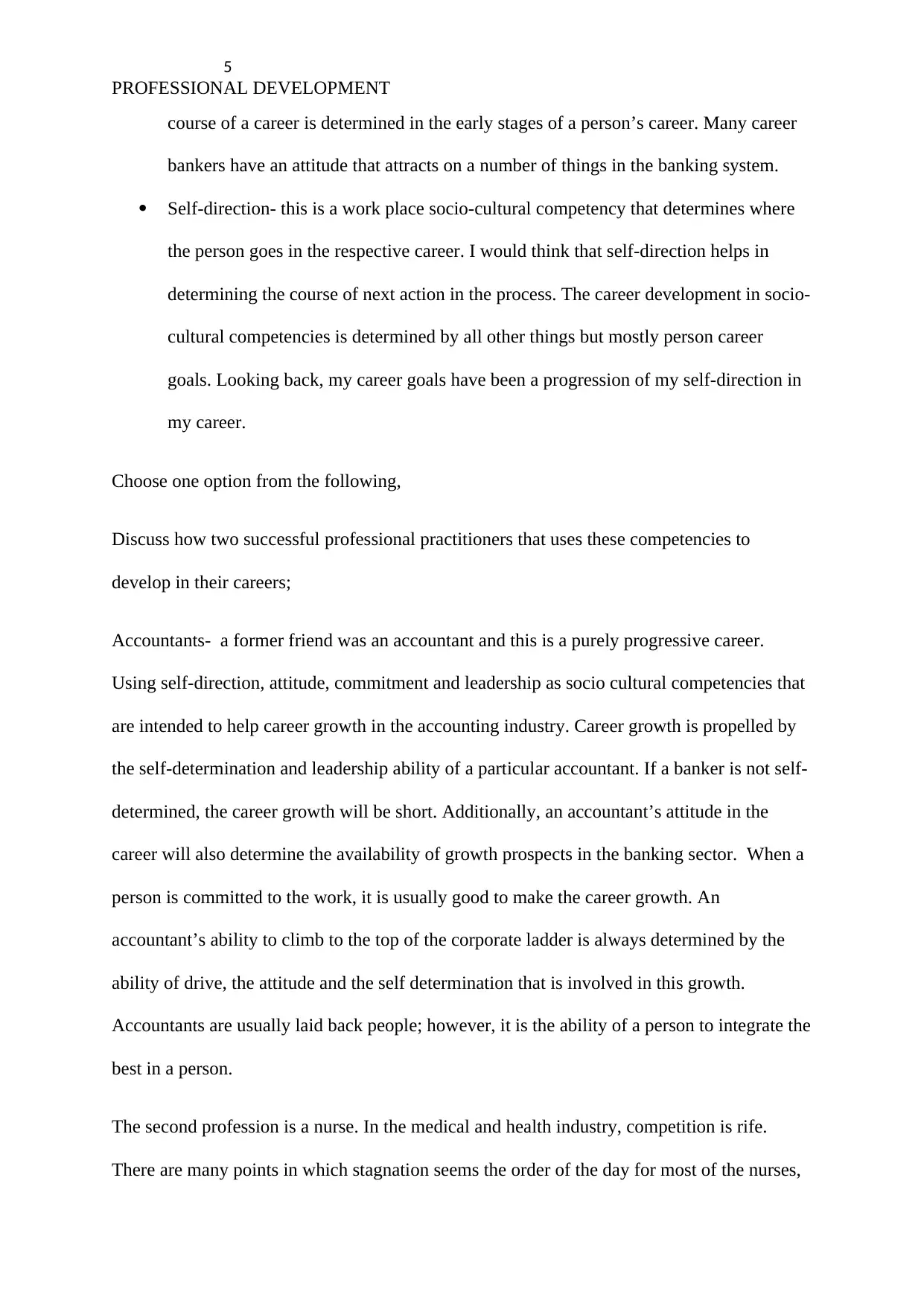
5
PROFESSIONAL DEVELOPMENT
course of a career is determined in the early stages of a person’s career. Many career
bankers have an attitude that attracts on a number of things in the banking system.
Self-direction- this is a work place socio-cultural competency that determines where
the person goes in the respective career. I would think that self-direction helps in
determining the course of next action in the process. The career development in socio-
cultural competencies is determined by all other things but mostly person career
goals. Looking back, my career goals have been a progression of my self-direction in
my career.
Choose one option from the following,
Discuss how two successful professional practitioners that uses these competencies to
develop in their careers;
Accountants- a former friend was an accountant and this is a purely progressive career.
Using self-direction, attitude, commitment and leadership as socio cultural competencies that
are intended to help career growth in the accounting industry. Career growth is propelled by
the self-determination and leadership ability of a particular accountant. If a banker is not self-
determined, the career growth will be short. Additionally, an accountant’s attitude in the
career will also determine the availability of growth prospects in the banking sector. When a
person is committed to the work, it is usually good to make the career growth. An
accountant’s ability to climb to the top of the corporate ladder is always determined by the
ability of drive, the attitude and the self determination that is involved in this growth.
Accountants are usually laid back people; however, it is the ability of a person to integrate the
best in a person.
The second profession is a nurse. In the medical and health industry, competition is rife.
There are many points in which stagnation seems the order of the day for most of the nurses,
PROFESSIONAL DEVELOPMENT
course of a career is determined in the early stages of a person’s career. Many career
bankers have an attitude that attracts on a number of things in the banking system.
Self-direction- this is a work place socio-cultural competency that determines where
the person goes in the respective career. I would think that self-direction helps in
determining the course of next action in the process. The career development in socio-
cultural competencies is determined by all other things but mostly person career
goals. Looking back, my career goals have been a progression of my self-direction in
my career.
Choose one option from the following,
Discuss how two successful professional practitioners that uses these competencies to
develop in their careers;
Accountants- a former friend was an accountant and this is a purely progressive career.
Using self-direction, attitude, commitment and leadership as socio cultural competencies that
are intended to help career growth in the accounting industry. Career growth is propelled by
the self-determination and leadership ability of a particular accountant. If a banker is not self-
determined, the career growth will be short. Additionally, an accountant’s attitude in the
career will also determine the availability of growth prospects in the banking sector. When a
person is committed to the work, it is usually good to make the career growth. An
accountant’s ability to climb to the top of the corporate ladder is always determined by the
ability of drive, the attitude and the self determination that is involved in this growth.
Accountants are usually laid back people; however, it is the ability of a person to integrate the
best in a person.
The second profession is a nurse. In the medical and health industry, competition is rife.
There are many points in which stagnation seems the order of the day for most of the nurses,
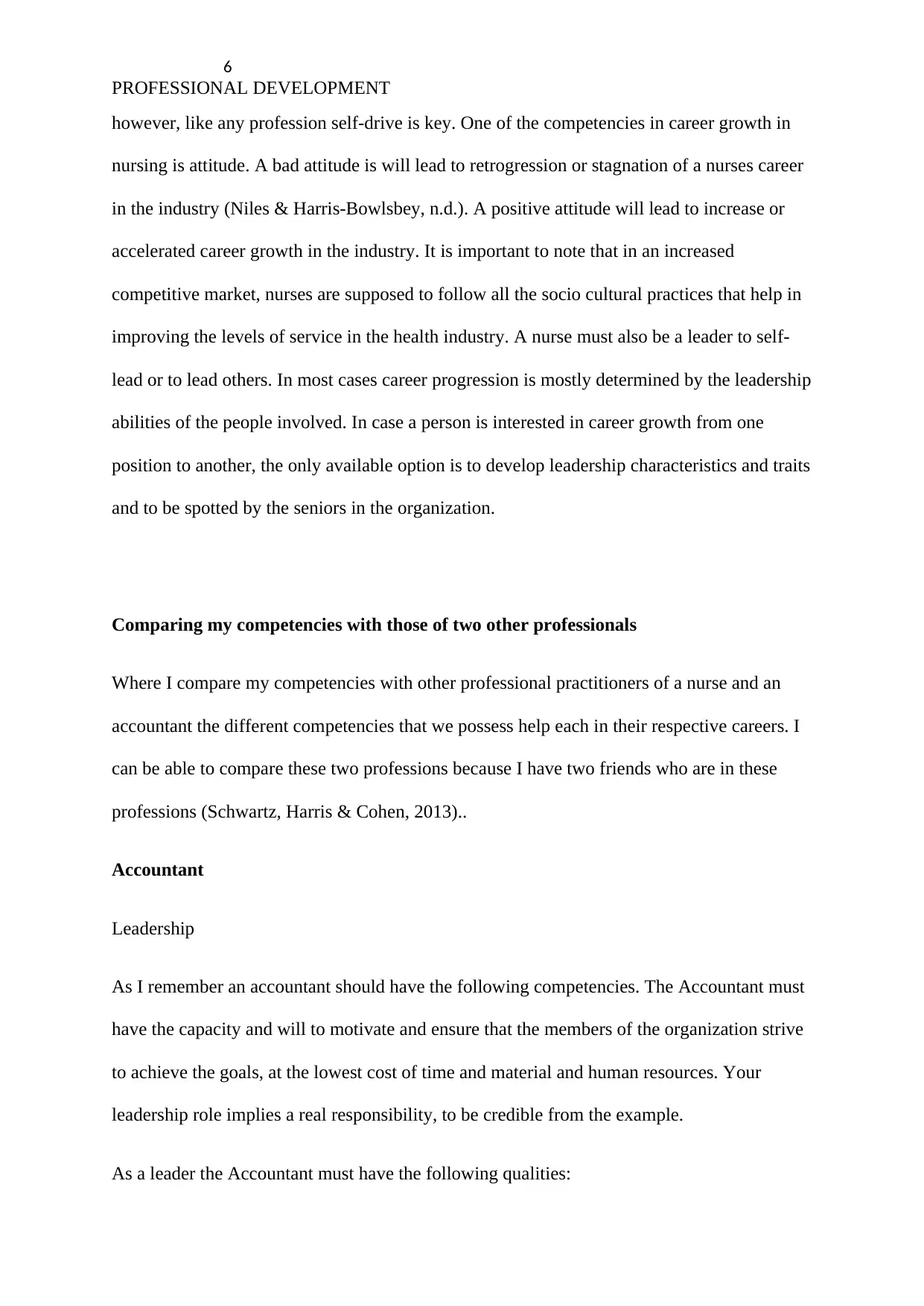
6
PROFESSIONAL DEVELOPMENT
however, like any profession self-drive is key. One of the competencies in career growth in
nursing is attitude. A bad attitude is will lead to retrogression or stagnation of a nurses career
in the industry (Niles & Harris-Bowlsbey, n.d.). A positive attitude will lead to increase or
accelerated career growth in the industry. It is important to note that in an increased
competitive market, nurses are supposed to follow all the socio cultural practices that help in
improving the levels of service in the health industry. A nurse must also be a leader to self-
lead or to lead others. In most cases career progression is mostly determined by the leadership
abilities of the people involved. In case a person is interested in career growth from one
position to another, the only available option is to develop leadership characteristics and traits
and to be spotted by the seniors in the organization.
Comparing my competencies with those of two other professionals
Where I compare my competencies with other professional practitioners of a nurse and an
accountant the different competencies that we possess help each in their respective careers. I
can be able to compare these two professions because I have two friends who are in these
professions (Schwartz, Harris & Cohen, 2013)..
Accountant
Leadership
As I remember an accountant should have the following competencies. The Accountant must
have the capacity and will to motivate and ensure that the members of the organization strive
to achieve the goals, at the lowest cost of time and material and human resources. Your
leadership role implies a real responsibility, to be credible from the example.
As a leader the Accountant must have the following qualities:
PROFESSIONAL DEVELOPMENT
however, like any profession self-drive is key. One of the competencies in career growth in
nursing is attitude. A bad attitude is will lead to retrogression or stagnation of a nurses career
in the industry (Niles & Harris-Bowlsbey, n.d.). A positive attitude will lead to increase or
accelerated career growth in the industry. It is important to note that in an increased
competitive market, nurses are supposed to follow all the socio cultural practices that help in
improving the levels of service in the health industry. A nurse must also be a leader to self-
lead or to lead others. In most cases career progression is mostly determined by the leadership
abilities of the people involved. In case a person is interested in career growth from one
position to another, the only available option is to develop leadership characteristics and traits
and to be spotted by the seniors in the organization.
Comparing my competencies with those of two other professionals
Where I compare my competencies with other professional practitioners of a nurse and an
accountant the different competencies that we possess help each in their respective careers. I
can be able to compare these two professions because I have two friends who are in these
professions (Schwartz, Harris & Cohen, 2013)..
Accountant
Leadership
As I remember an accountant should have the following competencies. The Accountant must
have the capacity and will to motivate and ensure that the members of the organization strive
to achieve the goals, at the lowest cost of time and material and human resources. Your
leadership role implies a real responsibility, to be credible from the example.
As a leader the Accountant must have the following qualities:
⊘ This is a preview!⊘
Do you want full access?
Subscribe today to unlock all pages.

Trusted by 1+ million students worldwide
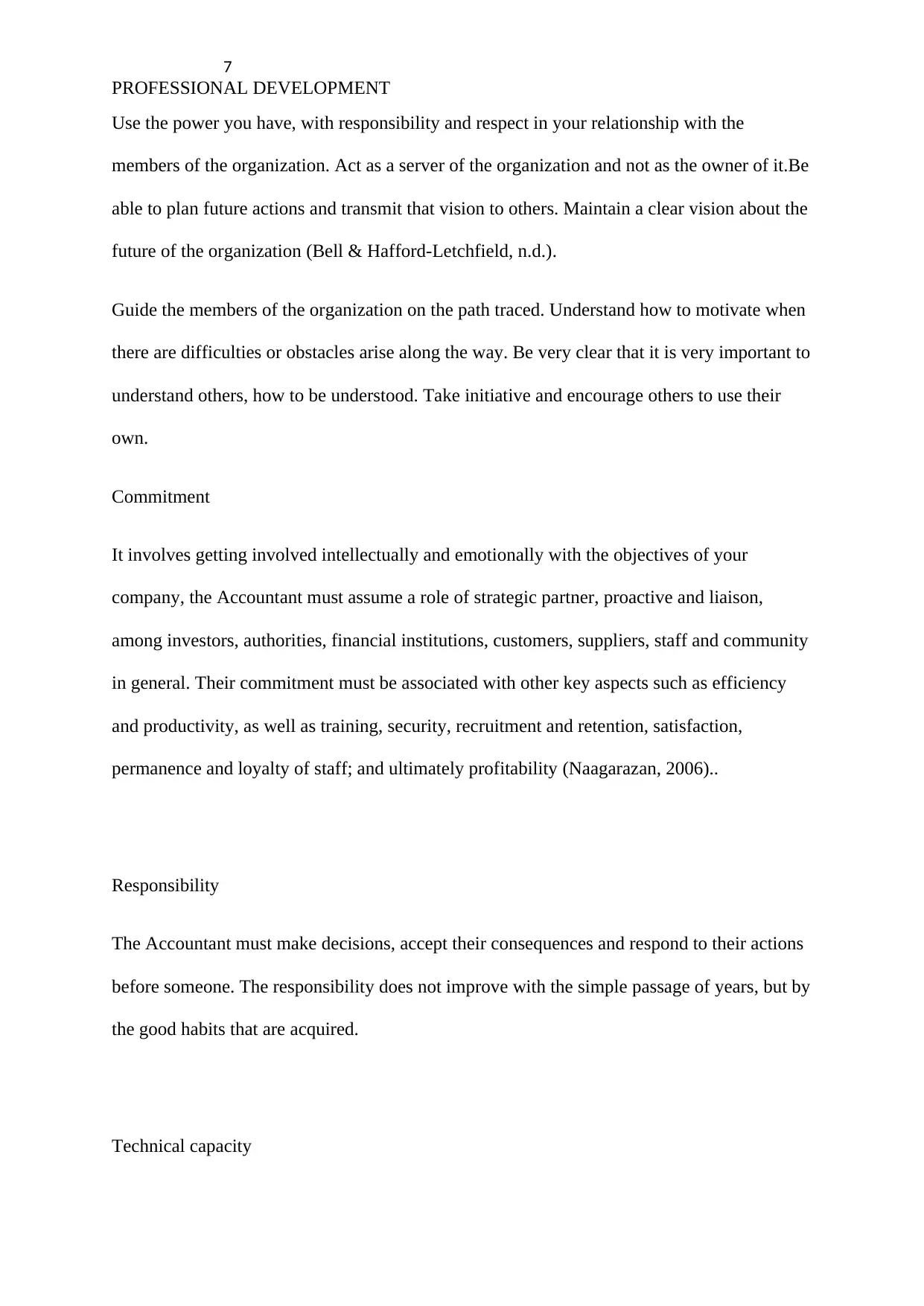
7
PROFESSIONAL DEVELOPMENT
Use the power you have, with responsibility and respect in your relationship with the
members of the organization. Act as a server of the organization and not as the owner of it.Be
able to plan future actions and transmit that vision to others. Maintain a clear vision about the
future of the organization (Bell & Hafford-Letchfield, n.d.).
Guide the members of the organization on the path traced. Understand how to motivate when
there are difficulties or obstacles arise along the way. Be very clear that it is very important to
understand others, how to be understood. Take initiative and encourage others to use their
own.
Commitment
It involves getting involved intellectually and emotionally with the objectives of your
company, the Accountant must assume a role of strategic partner, proactive and liaison,
among investors, authorities, financial institutions, customers, suppliers, staff and community
in general. Their commitment must be associated with other key aspects such as efficiency
and productivity, as well as training, security, recruitment and retention, satisfaction,
permanence and loyalty of staff; and ultimately profitability (Naagarazan, 2006)..
Responsibility
The Accountant must make decisions, accept their consequences and respond to their actions
before someone. The responsibility does not improve with the simple passage of years, but by
the good habits that are acquired.
Technical capacity
PROFESSIONAL DEVELOPMENT
Use the power you have, with responsibility and respect in your relationship with the
members of the organization. Act as a server of the organization and not as the owner of it.Be
able to plan future actions and transmit that vision to others. Maintain a clear vision about the
future of the organization (Bell & Hafford-Letchfield, n.d.).
Guide the members of the organization on the path traced. Understand how to motivate when
there are difficulties or obstacles arise along the way. Be very clear that it is very important to
understand others, how to be understood. Take initiative and encourage others to use their
own.
Commitment
It involves getting involved intellectually and emotionally with the objectives of your
company, the Accountant must assume a role of strategic partner, proactive and liaison,
among investors, authorities, financial institutions, customers, suppliers, staff and community
in general. Their commitment must be associated with other key aspects such as efficiency
and productivity, as well as training, security, recruitment and retention, satisfaction,
permanence and loyalty of staff; and ultimately profitability (Naagarazan, 2006)..
Responsibility
The Accountant must make decisions, accept their consequences and respond to their actions
before someone. The responsibility does not improve with the simple passage of years, but by
the good habits that are acquired.
Technical capacity
Paraphrase This Document
Need a fresh take? Get an instant paraphrase of this document with our AI Paraphraser
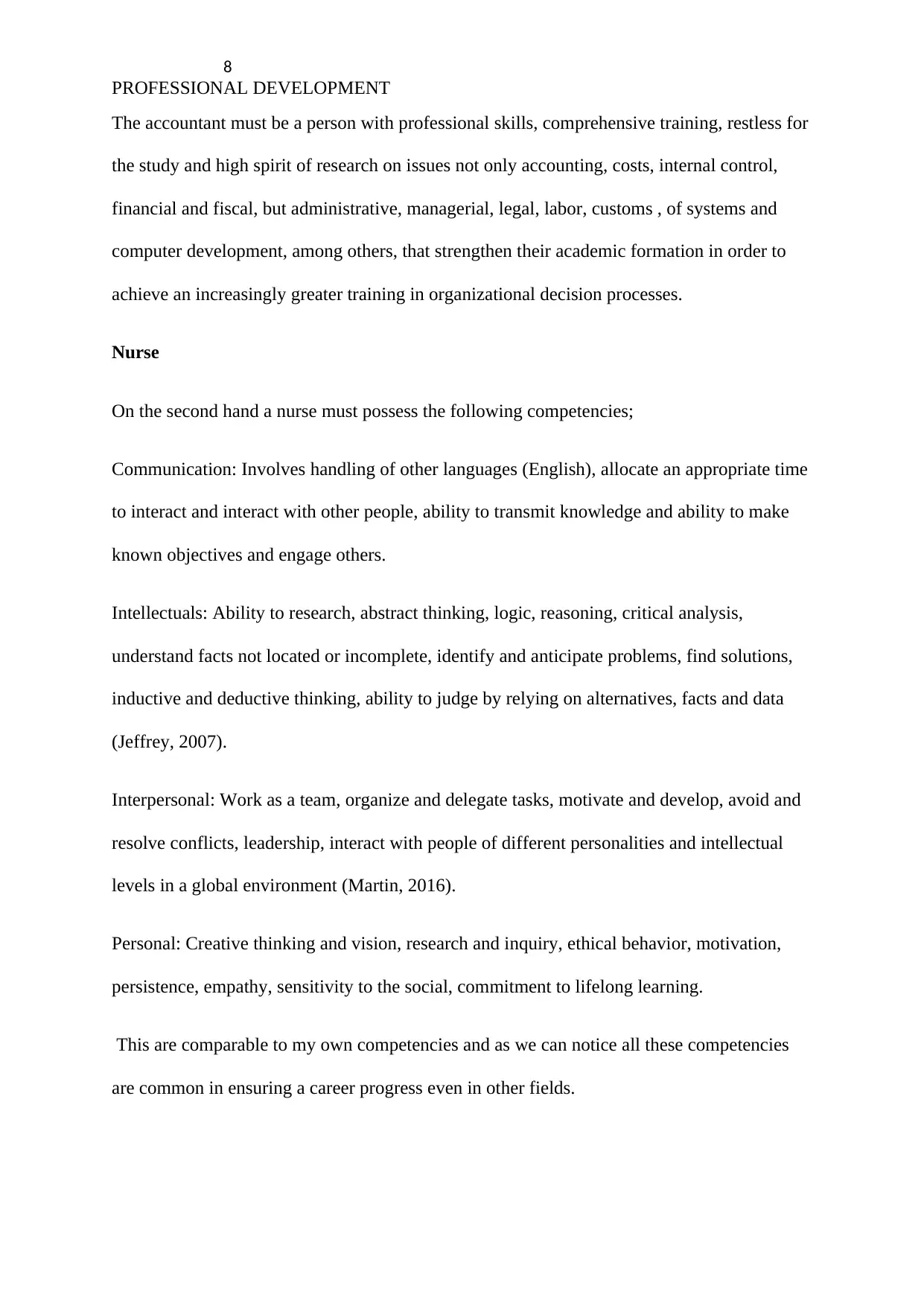
8
PROFESSIONAL DEVELOPMENT
The accountant must be a person with professional skills, comprehensive training, restless for
the study and high spirit of research on issues not only accounting, costs, internal control,
financial and fiscal, but administrative, managerial, legal, labor, customs , of systems and
computer development, among others, that strengthen their academic formation in order to
achieve an increasingly greater training in organizational decision processes.
Nurse
On the second hand a nurse must possess the following competencies;
Communication: Involves handling of other languages (English), allocate an appropriate time
to interact and interact with other people, ability to transmit knowledge and ability to make
known objectives and engage others.
Intellectuals: Ability to research, abstract thinking, logic, reasoning, critical analysis,
understand facts not located or incomplete, identify and anticipate problems, find solutions,
inductive and deductive thinking, ability to judge by relying on alternatives, facts and data
(Jeffrey, 2007).
Interpersonal: Work as a team, organize and delegate tasks, motivate and develop, avoid and
resolve conflicts, leadership, interact with people of different personalities and intellectual
levels in a global environment (Martin, 2016).
Personal: Creative thinking and vision, research and inquiry, ethical behavior, motivation,
persistence, empathy, sensitivity to the social, commitment to lifelong learning.
This are comparable to my own competencies and as we can notice all these competencies
are common in ensuring a career progress even in other fields.
PROFESSIONAL DEVELOPMENT
The accountant must be a person with professional skills, comprehensive training, restless for
the study and high spirit of research on issues not only accounting, costs, internal control,
financial and fiscal, but administrative, managerial, legal, labor, customs , of systems and
computer development, among others, that strengthen their academic formation in order to
achieve an increasingly greater training in organizational decision processes.
Nurse
On the second hand a nurse must possess the following competencies;
Communication: Involves handling of other languages (English), allocate an appropriate time
to interact and interact with other people, ability to transmit knowledge and ability to make
known objectives and engage others.
Intellectuals: Ability to research, abstract thinking, logic, reasoning, critical analysis,
understand facts not located or incomplete, identify and anticipate problems, find solutions,
inductive and deductive thinking, ability to judge by relying on alternatives, facts and data
(Jeffrey, 2007).
Interpersonal: Work as a team, organize and delegate tasks, motivate and develop, avoid and
resolve conflicts, leadership, interact with people of different personalities and intellectual
levels in a global environment (Martin, 2016).
Personal: Creative thinking and vision, research and inquiry, ethical behavior, motivation,
persistence, empathy, sensitivity to the social, commitment to lifelong learning.
This are comparable to my own competencies and as we can notice all these competencies
are common in ensuring a career progress even in other fields.
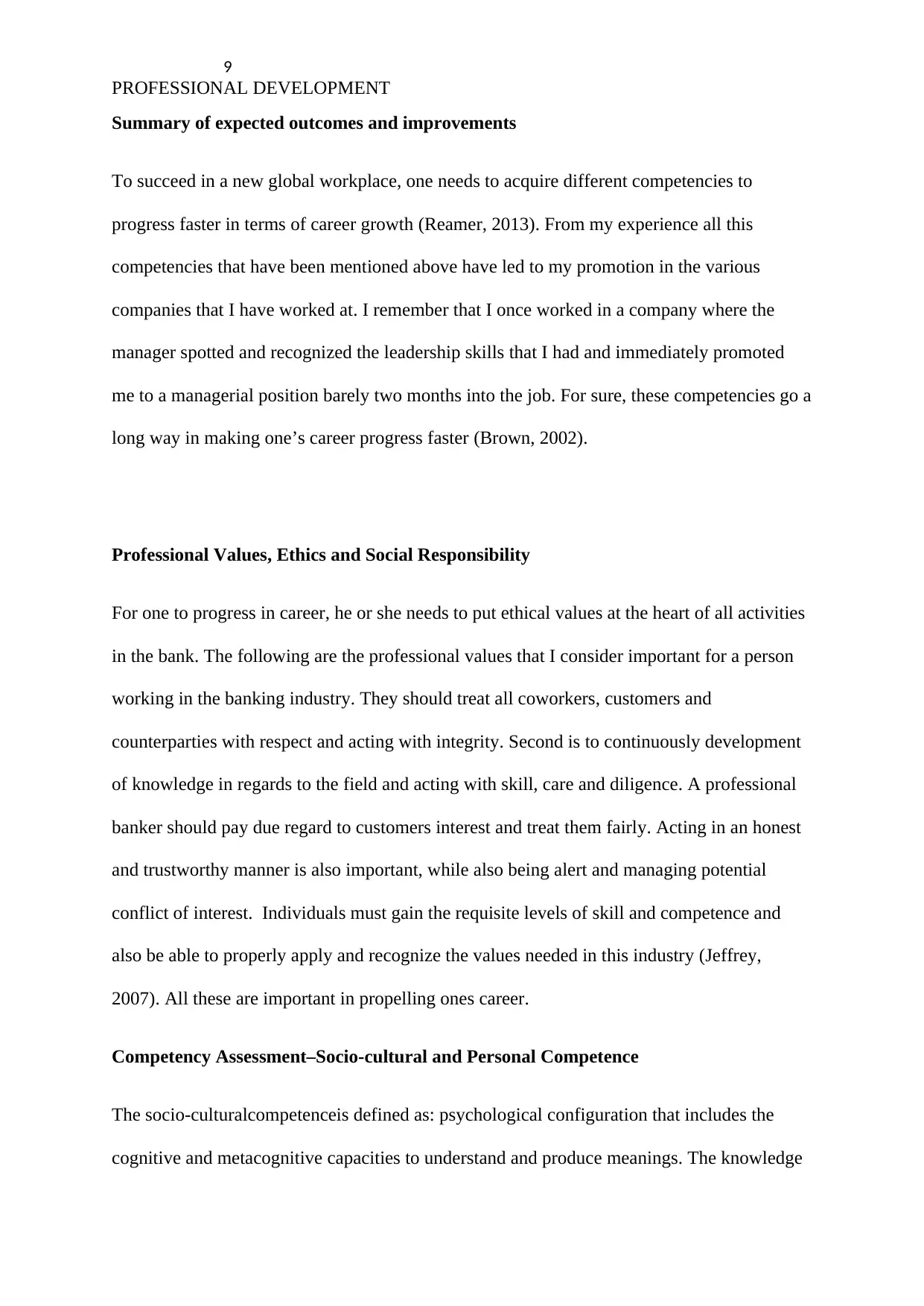
9
PROFESSIONAL DEVELOPMENT
Summary of expected outcomes and improvements
To succeed in a new global workplace, one needs to acquire different competencies to
progress faster in terms of career growth (Reamer, 2013). From my experience all this
competencies that have been mentioned above have led to my promotion in the various
companies that I have worked at. I remember that I once worked in a company where the
manager spotted and recognized the leadership skills that I had and immediately promoted
me to a managerial position barely two months into the job. For sure, these competencies go a
long way in making one’s career progress faster (Brown, 2002).
Professional Values, Ethics and Social Responsibility
For one to progress in career, he or she needs to put ethical values at the heart of all activities
in the bank. The following are the professional values that I consider important for a person
working in the banking industry. They should treat all coworkers, customers and
counterparties with respect and acting with integrity. Second is to continuously development
of knowledge in regards to the field and acting with skill, care and diligence. A professional
banker should pay due regard to customers interest and treat them fairly. Acting in an honest
and trustworthy manner is also important, while also being alert and managing potential
conflict of interest. Individuals must gain the requisite levels of skill and competence and
also be able to properly apply and recognize the values needed in this industry (Jeffrey,
2007). All these are important in propelling ones career.
Competency Assessment–Socio-cultural and Personal Competence
The socio-culturalcompetenceis defined as: psychological configuration that includes the
cognitive and metacognitive capacities to understand and produce meanings. The knowledge
PROFESSIONAL DEVELOPMENT
Summary of expected outcomes and improvements
To succeed in a new global workplace, one needs to acquire different competencies to
progress faster in terms of career growth (Reamer, 2013). From my experience all this
competencies that have been mentioned above have led to my promotion in the various
companies that I have worked at. I remember that I once worked in a company where the
manager spotted and recognized the leadership skills that I had and immediately promoted
me to a managerial position barely two months into the job. For sure, these competencies go a
long way in making one’s career progress faster (Brown, 2002).
Professional Values, Ethics and Social Responsibility
For one to progress in career, he or she needs to put ethical values at the heart of all activities
in the bank. The following are the professional values that I consider important for a person
working in the banking industry. They should treat all coworkers, customers and
counterparties with respect and acting with integrity. Second is to continuously development
of knowledge in regards to the field and acting with skill, care and diligence. A professional
banker should pay due regard to customers interest and treat them fairly. Acting in an honest
and trustworthy manner is also important, while also being alert and managing potential
conflict of interest. Individuals must gain the requisite levels of skill and competence and
also be able to properly apply and recognize the values needed in this industry (Jeffrey,
2007). All these are important in propelling ones career.
Competency Assessment–Socio-cultural and Personal Competence
The socio-culturalcompetenceis defined as: psychological configuration that includes the
cognitive and metacognitive capacities to understand and produce meanings. The knowledge
⊘ This is a preview!⊘
Do you want full access?
Subscribe today to unlock all pages.

Trusted by 1+ million students worldwide
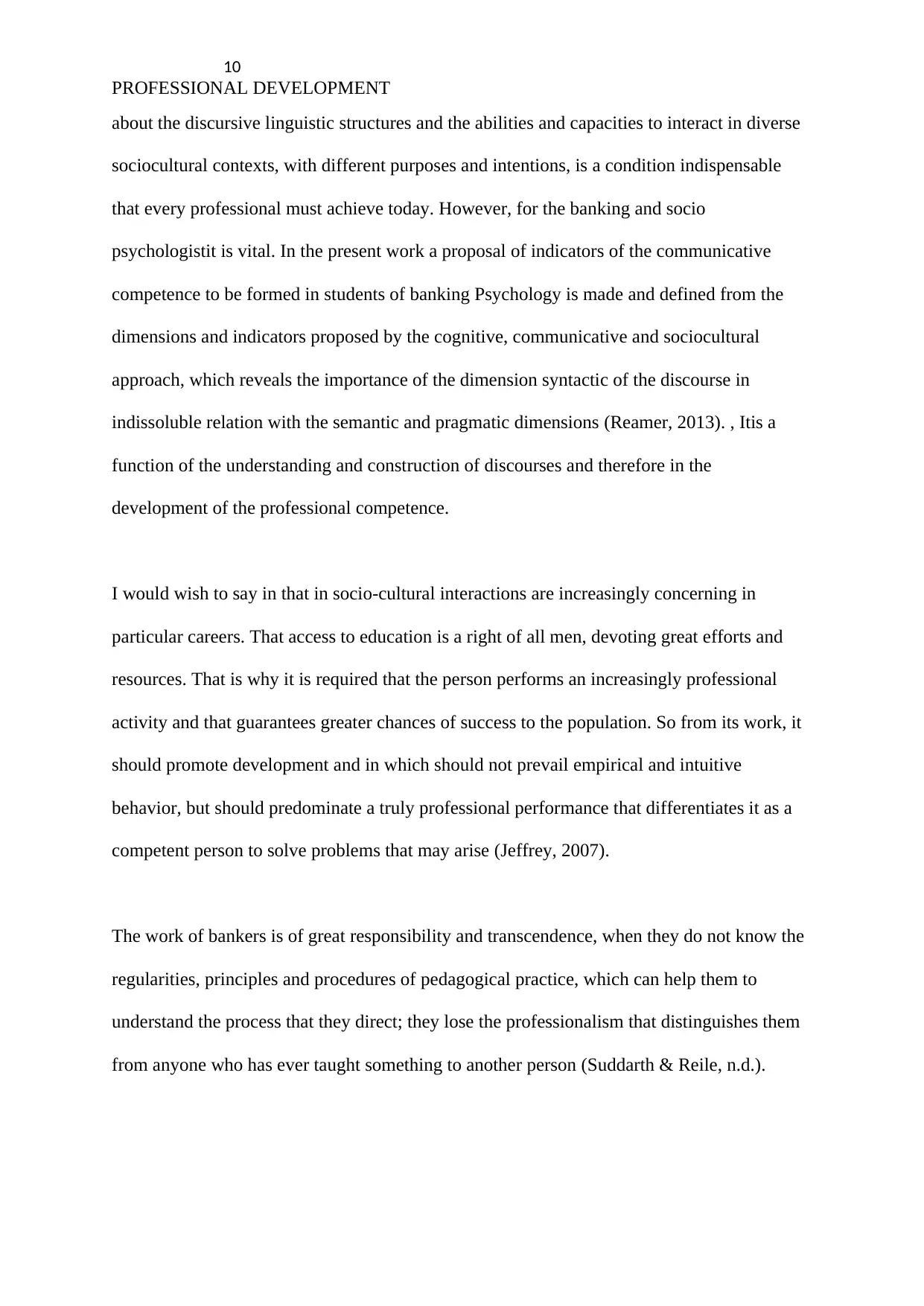
10
PROFESSIONAL DEVELOPMENT
about the discursive linguistic structures and the abilities and capacities to interact in diverse
sociocultural contexts, with different purposes and intentions, is a condition indispensable
that every professional must achieve today. However, for the banking and socio
psychologistit is vital. In the present work a proposal of indicators of the communicative
competence to be formed in students of banking Psychology is made and defined from the
dimensions and indicators proposed by the cognitive, communicative and sociocultural
approach, which reveals the importance of the dimension syntactic of the discourse in
indissoluble relation with the semantic and pragmatic dimensions (Reamer, 2013). , Itis a
function of the understanding and construction of discourses and therefore in the
development of the professional competence.
I would wish to say in that in socio-cultural interactions are increasingly concerning in
particular careers. That access to education is a right of all men, devoting great efforts and
resources. That is why it is required that the person performs an increasingly professional
activity and that guarantees greater chances of success to the population. So from its work, it
should promote development and in which should not prevail empirical and intuitive
behavior, but should predominate a truly professional performance that differentiates it as a
competent person to solve problems that may arise (Jeffrey, 2007).
The work of bankers is of great responsibility and transcendence, when they do not know the
regularities, principles and procedures of pedagogical practice, which can help them to
understand the process that they direct; they lose the professionalism that distinguishes them
from anyone who has ever taught something to another person (Suddarth & Reile, n.d.).
PROFESSIONAL DEVELOPMENT
about the discursive linguistic structures and the abilities and capacities to interact in diverse
sociocultural contexts, with different purposes and intentions, is a condition indispensable
that every professional must achieve today. However, for the banking and socio
psychologistit is vital. In the present work a proposal of indicators of the communicative
competence to be formed in students of banking Psychology is made and defined from the
dimensions and indicators proposed by the cognitive, communicative and sociocultural
approach, which reveals the importance of the dimension syntactic of the discourse in
indissoluble relation with the semantic and pragmatic dimensions (Reamer, 2013). , Itis a
function of the understanding and construction of discourses and therefore in the
development of the professional competence.
I would wish to say in that in socio-cultural interactions are increasingly concerning in
particular careers. That access to education is a right of all men, devoting great efforts and
resources. That is why it is required that the person performs an increasingly professional
activity and that guarantees greater chances of success to the population. So from its work, it
should promote development and in which should not prevail empirical and intuitive
behavior, but should predominate a truly professional performance that differentiates it as a
competent person to solve problems that may arise (Jeffrey, 2007).
The work of bankers is of great responsibility and transcendence, when they do not know the
regularities, principles and procedures of pedagogical practice, which can help them to
understand the process that they direct; they lose the professionalism that distinguishes them
from anyone who has ever taught something to another person (Suddarth & Reile, n.d.).
Paraphrase This Document
Need a fresh take? Get an instant paraphrase of this document with our AI Paraphraser
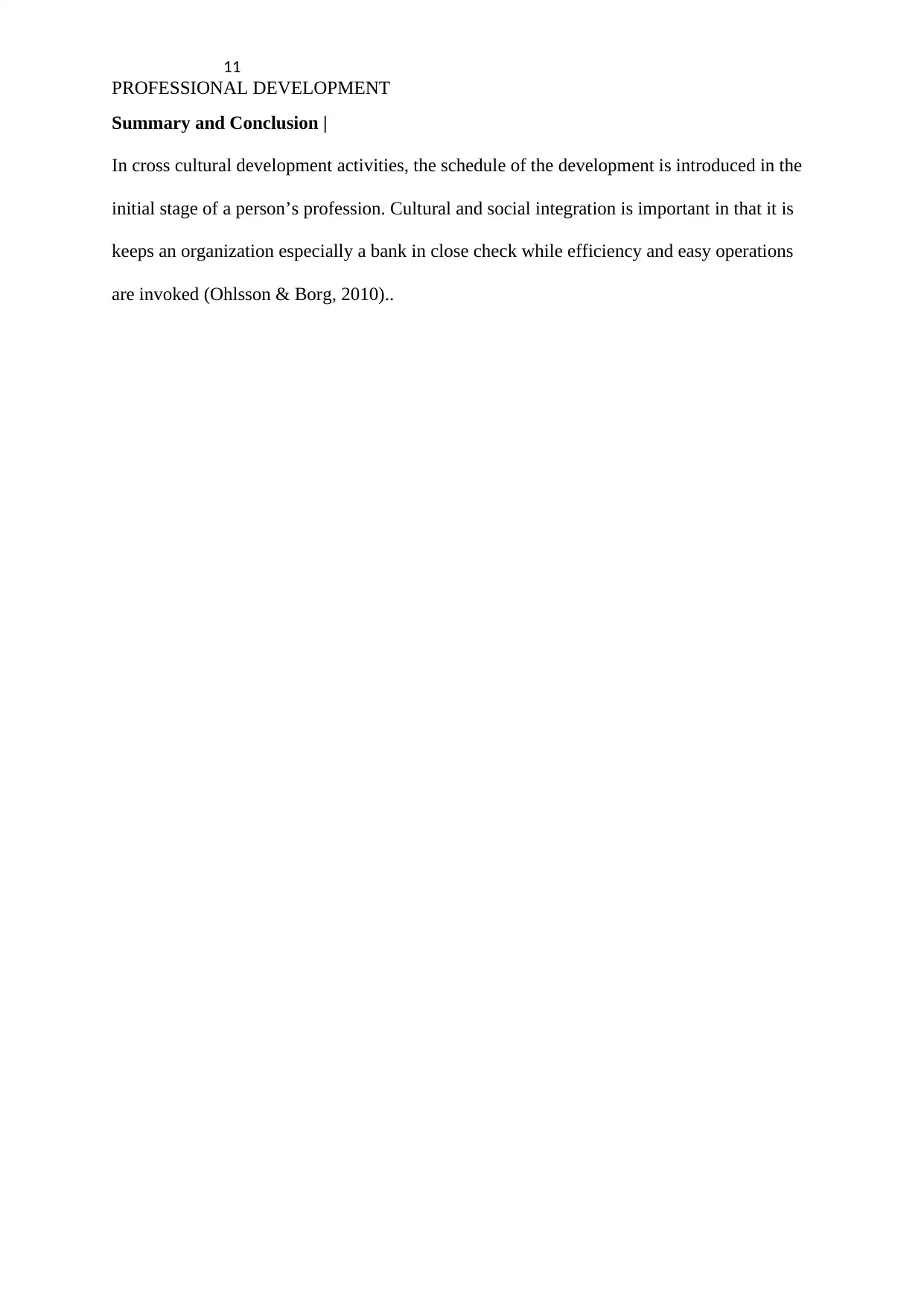
11
PROFESSIONAL DEVELOPMENT
Summary and Conclusion |
In cross cultural development activities, the schedule of the development is introduced in the
initial stage of a person’s profession. Cultural and social integration is important in that it is
keeps an organization especially a bank in close check while efficiency and easy operations
are invoked (Ohlsson & Borg, 2010)..
PROFESSIONAL DEVELOPMENT
Summary and Conclusion |
In cross cultural development activities, the schedule of the development is introduced in the
initial stage of a person’s profession. Cultural and social integration is important in that it is
keeps an organization especially a bank in close check while efficiency and easy operations
are invoked (Ohlsson & Borg, 2010)..
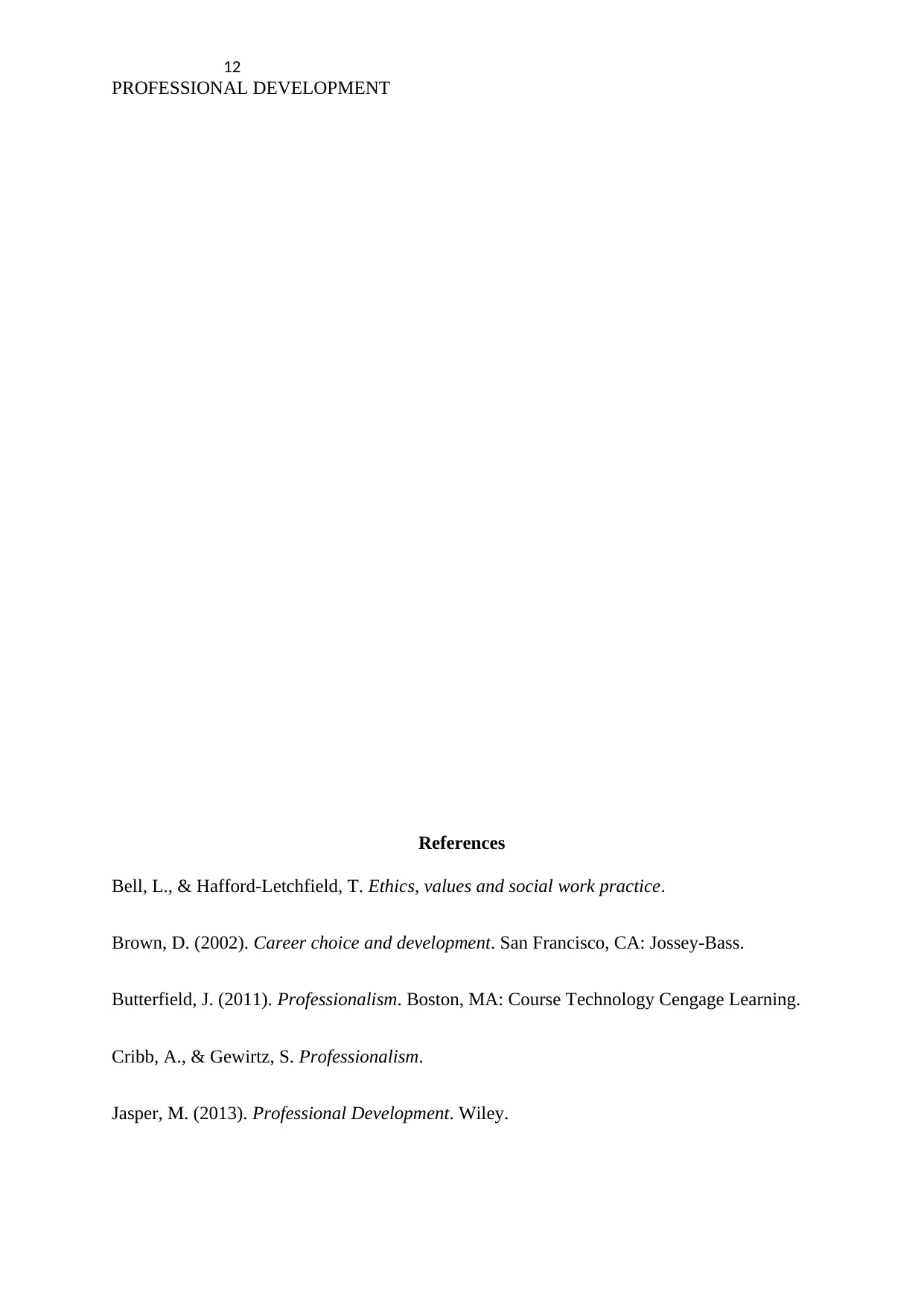
12
PROFESSIONAL DEVELOPMENT
References
Bell, L., & Hafford-Letchfield, T. Ethics, values and social work practice.
Brown, D. (2002). Career choice and development. San Francisco, CA: Jossey-Bass.
Butterfield, J. (2011). Professionalism. Boston, MA: Course Technology Cengage Learning.
Cribb, A., & Gewirtz, S. Professionalism.
Jasper, M. (2013). Professional Development. Wiley.
PROFESSIONAL DEVELOPMENT
References
Bell, L., & Hafford-Letchfield, T. Ethics, values and social work practice.
Brown, D. (2002). Career choice and development. San Francisco, CA: Jossey-Bass.
Butterfield, J. (2011). Professionalism. Boston, MA: Course Technology Cengage Learning.
Cribb, A., & Gewirtz, S. Professionalism.
Jasper, M. (2013). Professional Development. Wiley.
⊘ This is a preview!⊘
Do you want full access?
Subscribe today to unlock all pages.

Trusted by 1+ million students worldwide
1 out of 13
Related Documents
Your All-in-One AI-Powered Toolkit for Academic Success.
+13062052269
info@desklib.com
Available 24*7 on WhatsApp / Email
![[object Object]](/_next/static/media/star-bottom.7253800d.svg)
Unlock your academic potential
Copyright © 2020–2025 A2Z Services. All Rights Reserved. Developed and managed by ZUCOL.





